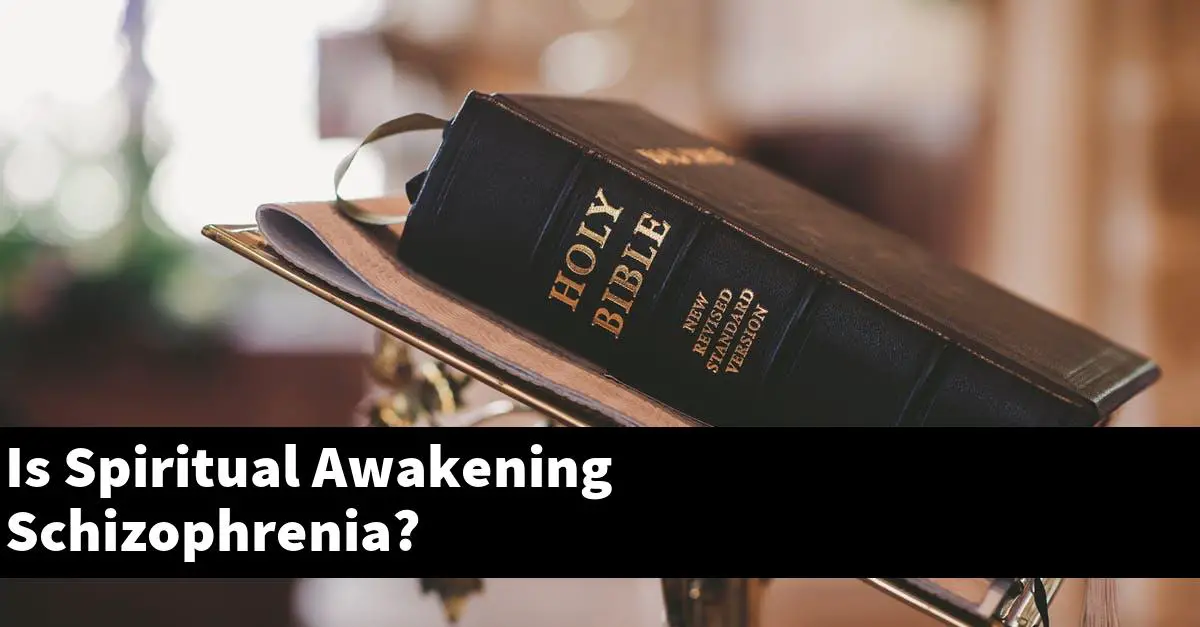What is spiritual awakening and does it have anything to do with schizophrenia?
No, spiritual awakening is not the same as schizophrenia. Schizophrenia is a mental disorder that is characterized by hallucinations, delusions, and disordered thinking, while spiritual awakening is a process of expanding one’s consciousness and gaining a greater understanding of the universe.
The article will explore whether or not spiritual awakening is a form of schizophrenia.
Can spiritual awakening lead to schizophrenia?
There is no clear answer to whether spiritual awakening can lead to schizophrenia. Some people may experience symptoms of schizophrenia after having a spiritual awakening, but it is unclear if the two are directly related. Some researchers believe that schizophrenia may be caused by a disconnection from reality, and that spiritual experiences can trigger this disconnection. However, it is also possible that people with schizophrenia are simply more likely to have spiritual experiences. It is difficult to say for sure whether there is a causal relationship between the two.
What are the similarities between spiritual awakening and schizophrenia?
There are a number of similarities between spiritual awakening and schizophrenia. Both experiences can involve a sense of profound connection with the universe, a loss of interest in everyday life, and a feeling of being apart from the rest of humanity. Both can also involve hallucinations and delusions, although the content of these may differ. For example, people with schizophrenia may hear voices that tell them to hurt themselves or others, whereas those experiencing a spiritual awakening may hear messages that are supportive or positive. Other similarities between the two experiences include a sense of having special knowledge or insight, and a feeling of being on a special mission or path.
Are religious delusions related to religiosity in schizophrenia?
There has been much debate surrounding the relationship between religious delusions and religiosity in schizophrenia. Some believe that religious delusions are simply a manifestation of the illness and are not related to religiosity. Others believe that religious delusions may be related to religiosity, but that they are not necessarily caused by it. Still others believe that religious delusions are caused by religiosity.
It is difficult to study this relationship because it is hard to measure religiosity. Some studies have used self-reported measures of religiosity, while others have used measures of religious affiliation or church attendance. It is also difficult to study because religious beliefs are so personal and because people with schizophrenia may have different levels of religiosity at different times in their illness.
Some studies have found that people with schizophrenia who have religious delusions are more likely to be religious than those without religious delusions. Other studies have found no relationship between religious delusions and religiosity. It is possible that the relationship between religious delusions and religiosity varies from person to person.
It is also important to consider the content of religious delusions when studying the relationship between religious delusions and religiosity. Some religious delusions may be more likely to be associated with religiosity than others. For example, delusions about being chosen by God or about having a special mission from God may be more likely to be associated with religiosity than delusions about being persecuted by God or about the end of the world.
The relationship between religious delusions and religiosity is complex and needs to be studied further. It is possible that religious delusions are related to religiosity in some people with schizophrenia, but not in others.
What percentage of schizophrenics are religious?
There is no one answer to this question as religious beliefs and practices vary greatly among people with schizophrenia. Some individuals may be very devout and active in their faith, while others may not believe in any higher power or follow any particular religion. There is no way to know for sure what percentage of people with schizophrenia are religious, but it is likely that there is a wide range of religious beliefs and practices among this population.
What are the symptoms of spiritual awakening?
When we talk about spiritual awakening, we are referring to a process of becoming more aware of our true nature. This can happen through practices like meditation, prayer, or simply spending time in nature. The symptoms of spiritual awakening can vary from person to person, but there are some common signs that indicate that someone is going through this process.
One of the most common symptoms of spiritual awakening is a sudden interest in spiritual or metaphysical topics. This can manifest as a desire to learn more about meditation, yoga, energy healing, or any number of other subjects that fall outside of the traditional religious paradigm. This is often accompanied by a feeling that there is more to life than what we can see and touch.
Another common symptom is a shift in priorities. Once someone begins to awaken spiritually, they often find that their values and priorities change. They may no longer be as interested in material possessions or power, and may instead focus on things like inner peace and compassion.
There can also be physical symptoms of spiritual awakening, such as changes in sleep patterns or diet, or a sudden increase in energy levels. Some people also report experiencing synchronicities, or meaningful coincidences, more often.
Of course, not everyone will experience all of these symptoms, and the degree to which they are experienced can vary. But for many people, these changes can be profound and life-changing.
What happens when you go through a spiritual awakening?
A spiritual awakening is a process that can happen to anyone at any time. It is a shift in consciousness that brings about a new way of seeing and experiencing the world.
During a spiritual awakening, you may suddenly become aware of things that you were previously unaware of. You may see the world in a new light and have a new understanding of yourself and others. You may also experience a range of emotions, from joy and peace to fear and confusion.
A spiritual awakening can be a life-changing experience that leads to personal growth and transformation. It can be a challenge to adjust to a new way of seeing the world, but it can also be an exciting and enriching time.
How common are religious delusions in schizophrenia?
There is no one answer to this question as it is difficult to determine how common religious delusions are in schizophrenia due to the fact that there is no agreed upon definition of what a religious delusion is. However, some studies have estimated that between 15-50% of people with schizophrenia experience religious delusions. religious delusions are often characterized by themes of persecution, grandiosity, and guilt. People with religious delusions may believe that they are being persecuted by God or the devil, that they are God or the devil, or that they have a special mission from God. They may also believe that they are sinless or that they have committed unforgivable sins. People with religious delusions often have very intense and rigid beliefs that are not based in reality. Treatment for religious delusions typically involves medication and psychotherapy.
How does religion affect schizophrenia?
There is no one answer to this question as the impact of religion on schizophrenia can vary depending on the individual. For some people, religion may be a source of support and comfort, while for others it may be a source of stress or conflict.
There is some evidence to suggest that religious belief can influence the course of schizophrenia. For example, one study found that people with schizophrenia who had strong religious beliefs were more likely to experience fewer symptoms and a less severe form of the illness.
However, it is important to remember that religion is just one factor that can affect schizophrenia. There are many other factors, such as genetics, that play a role in the development and course of the illness.
How religious beliefs affect mental health?
Religious beliefs play a significant role in shaping an individual’s mental health. Mental health is determined by various factors, including an individual’s physical health, social environment, and psychological wellbeing. Religious beliefs can impact all of these factors.
For example, religious beliefs can affect an individual’s physical health by influencing their decision to seek medical treatment, or by impacting their health behaviors. In addition, religious beliefs can shape an individual’s social environment by influencing the types of relationships they form and the activities they participate in. Finally, religious beliefs can directly impact an individual’s psychological wellbeing by influencing their thoughts, emotions, and behaviors.
There is a growing body of research that suggests religious beliefs can have a positive impact on mental health. For example, religious beliefs can promote positive coping mechanisms, provide social support, and increase levels of hopefulness and optimism. In addition, religious beliefs can help individuals make meaning out of difficult life experiences and promote a sense of purpose and belonging.
While religious beliefs can have a positive impact on mental health, it is important to remember that not all religious beliefs are beneficial. Some religious beliefs can actually promote negative mental health outcomes. For example, religious beliefs that are excessively rigid or dogmatic can lead to feelings of isolation and anxiety. In addition, religious beliefs that focus on punishment or damnation can promote guilt, shame, and fear.
It is important to remember that religious beliefs are just one of many factors that can impact mental health. If you are struggling with mental health issues, it is important to seek professional help.
What is the connection between schizophrenia and religion?
There is no one answer to this question as the connection between schizophrenia and religion is complex and unique to each individual. However, there are some generalities that can be made.
For many people with schizophrenia, religious beliefs and experiences are a central part of their lives. For some, religious beliefs may help to make sense of their experiences and provide a framework for understanding the world. For others, religious beliefs may be a source of comfort and support.
However, religion can also be a source of stress and conflict for people with schizophrenia. Some religious beliefs may be at odds with the experiences and symptoms of schizophrenia, which can lead to feelings of isolation and confusion. Additionally, some religious groups may not be accepting of mental illness, which can further alienate individuals with schizophrenia.
Conclusion
No, spiritual awakening is not the same as schizophrenia. Schizophrenia is a mental disorder that is characterized by hallucinations, delusions, and disordered thinking, while spiritual awakening is a process of spiritual growth and development. While there may be some similarities between the two experiences, they are not the same.

